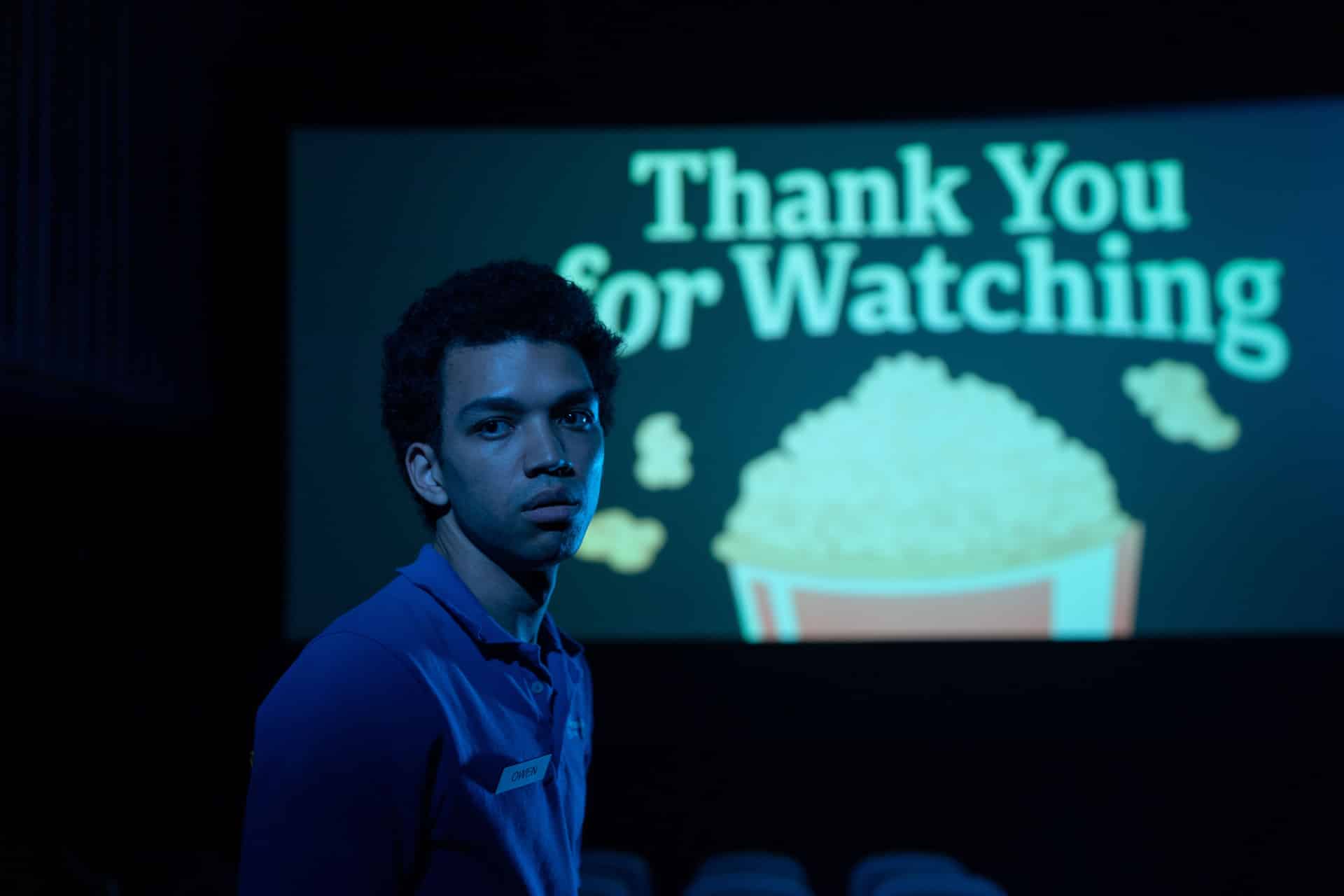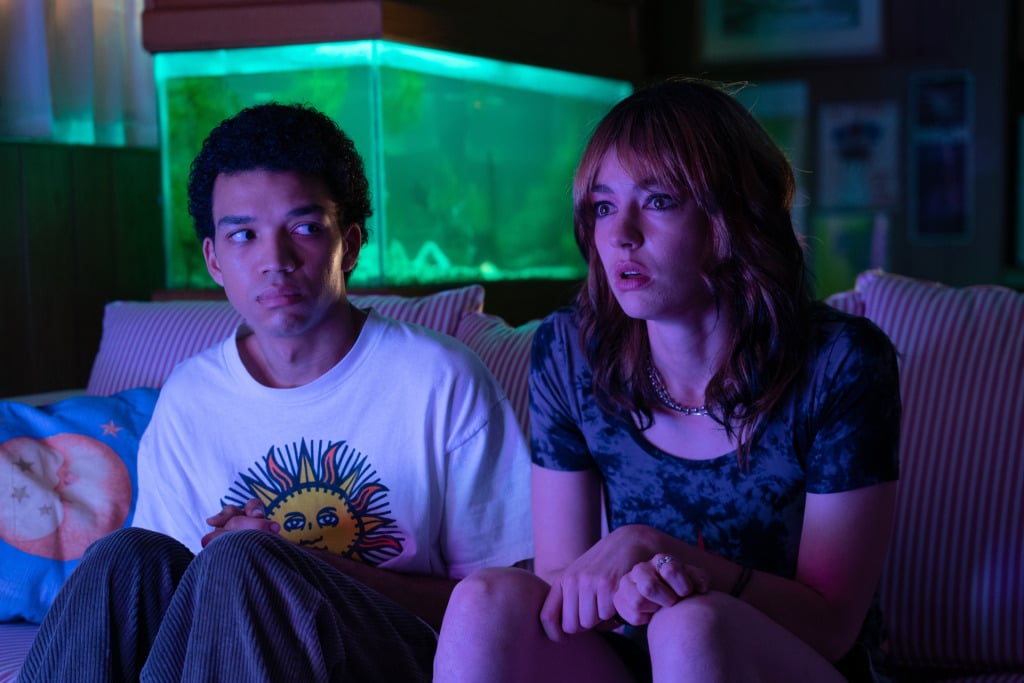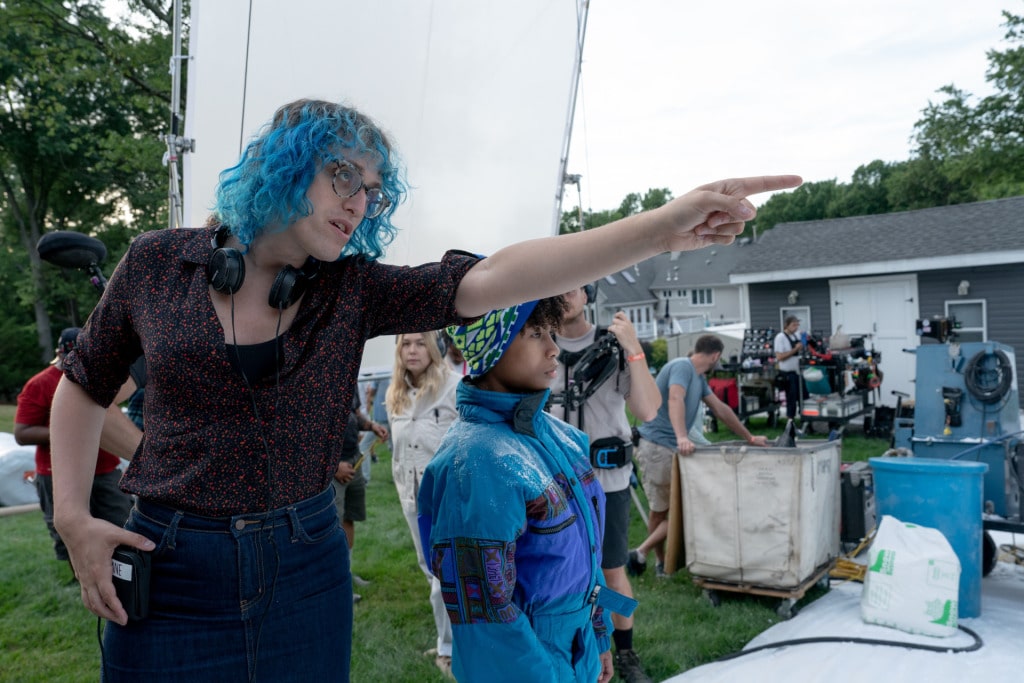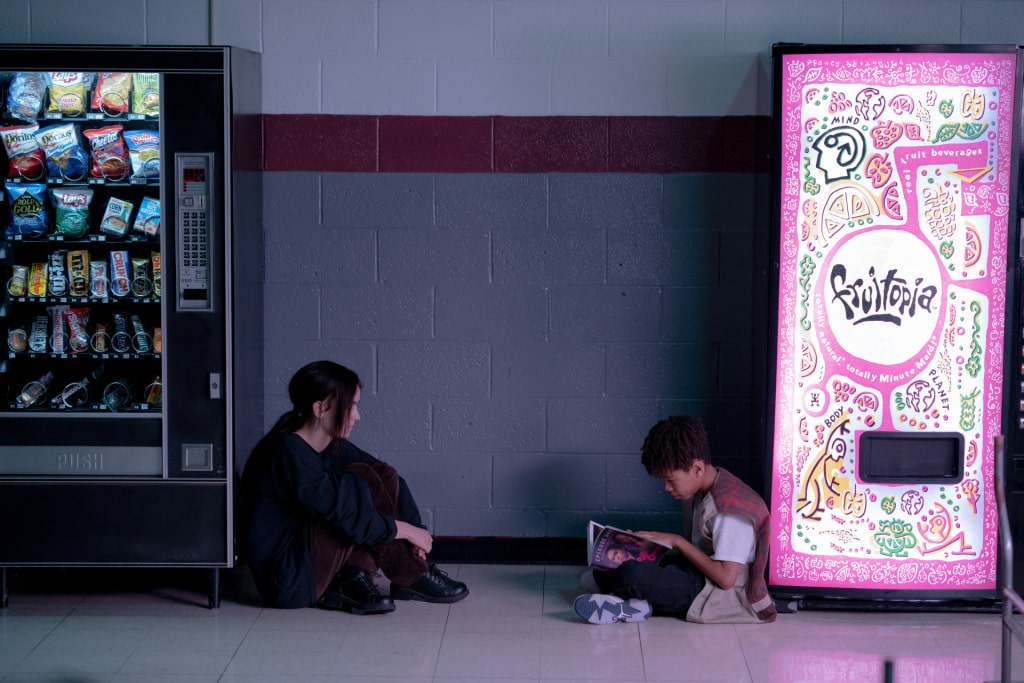
After making a splash at Sundance’s Midnight strand—and now showing as part of Sundance London—trans writer-director Jane Schoenbrum’s neon-drenched sci-fi horror I Saw The TV Glow has enjoyed a rapturous reception from critics and audiences alike. A passionate, dream-like exploration of the search for identity in the media we consume, the film treads a similar ground to Schoenbrum’s acclaimed 2021 lo-fi horror debut, We’re All Going To The World’s Fair, which examined the world of online horror role-playing games.
Schoenbrum’s new film stars Justice Smith and Brigette Lundy-Paine as Owen and Maddy, a pair of lonely teenagers who bond over their obsessive love of teen TV show The Pink Opaque, a monster-fighting fantasy adventure about two girls with special powers. The show serves as a place of acceptance and escapism for the protagonists, who are both in the process of discovering their identities as people who don’t feel they belong in the outside world, a clear metaphor that’s bound to resonate with anyone experiencing a similar journey.
However, the film takes a disturbing turn when the show gets unexpectedly cancelled and both teens find their lives upended as a result, with Maddy believing she’s living inside the show and Owen gradually losing his grip on reality. A Rabbit’s Foot caught up with the writer-director to discuss formative experiences, fandom, film influences and fantasy fathers David Lynch and David Cronenberg.
Matthew Turner: How did the film come about?
Jane Schoenbrum: I had finished my first film, which was a very small movie made for almost nothing, but it was a very personal film that I had made while going through the process of coming out as trans and queer. And it was very much a film reflecting on a teenage experience of dysphoria, a teenage experience of feeling sort of alienated from my own body, even alienated from my identity and reality, and really looking for myself through the screen, in this case on the internet. And that film, which was set within the online creepypasta community, talked about these kids playing an online horror role-playing game as a way to talk about the way we look for ourselves in fiction before we’re ready to look for ourselves in reality.
I had this idea for a movie that was talking about our relationship to screens in a similar way as my first film, but it was about these kids who couldn’t let go of a cancelled TV show, and couldn’t let go of the way this television show ended, and the way that that sort of unfinished business made them feel a sense of unreality in the real world. And I think I realised that this was a metaphor, again, for sort of talking about the ways in which we—trans people and queer people —kind of half live in the world before transition.
I wrote it, and then made it very early in the process of transition. It’s not necessarily a movie about transition, it’s a movie about seeing yourself for the first time and all of the ways you avoid that before you’re ready to.

MT: The show that the kids are obsessed with in the movie is called The Pink Opaque, so what was your Pink Opaque?
JS: Ha! My Pink Opaque was Buffy the Vampire Slayer. The movie is drawn from a lot of ’90s television tropes and different shows. But Buffy—and I mean this quite literally—was my first love. You know, I think it’s funny, I watched that show from 1997, when I would have been 10 years old to when it went off the air in 2003, and that was more than half of my life. Seven years of every week returning to these characters who you’re going to have like an emotional relationship with. This was one of the primary emotional relationships in my life at the time, which I think says something about the kind of life I was living as a queer closeted kid. I thought of the characters on the TV show almost as family. And when it ended, there was a loss there.
Looking back on this from adulthood and from post transition, as much as I’m thankful for that show and the relationship I had with it, it also strikes me as strange and uncanny and perhaps a little bit sad that I had invested so much of my youth in this thing that I could only see on a screen.
MT: How much of your own real life experience did you put into the film? What kind of interests did you have as a child?
JS: I was an incredibly creative kid. I would write fan-fiction or I would make up my own TV shows in my head. I don’t know that I was so encouraged in the suburbs, where I grew up, to chase that creativity. I think I spent a lot of time inside my head, and I’m sure that had something to do with the ways in which I didn’t feel comfortable being myself in this sort of very monocultural and almost repressive, suburban environment. I had friends, I wasn’t like a total loner, but I think I spent a lot of time in my imagination. When I finally did come out and start making films, it was like this dam had finally come unstuck. And I finally felt like I had the voice and the identity that I wanted to share with the world.
MT: Did music play a big part in your identity formation?
JS: Oh, yeah. When I was 13 or 14, I met a girl in the grade older than me and she invited me over to her house and told me all of the cool bands to listen to, and this was as formative for me as television was. Like Owen and Maddy clinging to TV in the film, I really clung to music. I think I found in music, as a kid, another sort of channel into an experience. I would hear tones or personalities, gentleness, perhaps in the music that I loved that felt like a way to understand myself that wasn’t available in the more normative culture around me.

MT: And The Cocteau Twins?
JS: So influential to me. The Cocteau Twins, of course, released a compilation called The Pink Opaque, and the movie borrows that name for the TV show. That was supposed to be a placeholder, but it was the perfect name. The Cocteau Twins express something very close and personal to me and very queer. I love music that can make me sort of feel like I’m swimming in a different world.
MT: Do you have personal experience of also being part of specific fan cultures?
JS: Oh yeah, I spent my youth on various message boards, The X-Files, Buffy the Vampire Slayer, various bands that I liked at the time. I was never a big poster, I tended to lurk. It was much more for me about engaging just by being a fan and reading other people’s ideas. But occasionally, I would write some fan fiction. I remember at one point, I wrote some fake spoilers for Buffy the Vampire Slayer for what would happen next, and these got picked up and sort of spread around the internet as if they were true. And I was proud of that.
MT: David Lynch and David Cronenberg were obviously a big influence on this film. Can you talk a little bit about them in particular?
JS: Yeah, my two dads, both named David! I remember seeing Mulholland Drive. A friend’s parents took me to see that movie in theatres. I would have been 13 at the time, and I remember feeling confused. This very particular feeling, I remember feeling it as well with the film Starship Troopers by Paul Verhoeven. They were films that were expressing something, usually I think kind of sexual, that I just didn’t quite understand at the time, and made me feel uncomfortable in a way that was destabilising. As a Lynch fan as a kid, Twin Peaks was the big one for me. I watched that show over and over again and was devastated by what had been the cliffhanger ending until 2017, with Dale looking in the mirror. I had nightmares about it. I was like, what happened to Dale? Is he going to be okay?
But I think I found a real love of Lynch and Cronenberg in my early 20s, I just found myself revisiting those films over and over again. I think especially Cronenberg—his relationship with the body obviously is a big influence. The way that his humans feel alien is just something I’m endlessly fascinated by. For Lynch, I think it’s just his processes are so remarkable. And when I sort of swim in his dream worlds, they just feel like a thing that I try to do, which is to work from a subconscious place in how I construct my movies.

MT: How do you navigate working through your very many references and inspirations, but also creating something that is so totally unique?
JS: I really try to make something that feels like the inside of my head. Just like the Cocteau Twins’ music takes me to a certain place or a David Lynch film takes me to a certain place, or a Martin Scorsese film takes me to a certain place, I have my own place, I have my own region in my brain that is resonant in a particular way, and obviously, is inspired by people who are perhaps fellow creative travellers and creating their own regions, but I really like just trying to put something on screen that feels comforting, or feels like home to me, or feels authentic to what the piece of art that doesn’t exist that I dream about could be.
There is something about making this film and being on set, and just being in movie theatres and basements and malls, where I was like, oh, why do I keep returning to these spaces, especially the screen. I would joke on my World’s Fair press tour and say that I want to make movies where just like Kiarostami continues to return to the car, I return to the screen. There’s just something about it as a visual image or metaphor that feels impossibly deep to me. I think it’s a beautiful metaphor for the way that identity can feel diffuse or unreal to me, these recurring dreams, where you’re watching television, and then all of a sudden you are the character in the show. I also think that it’s like, write what you know, and I spent my childhood hiding in screens.



